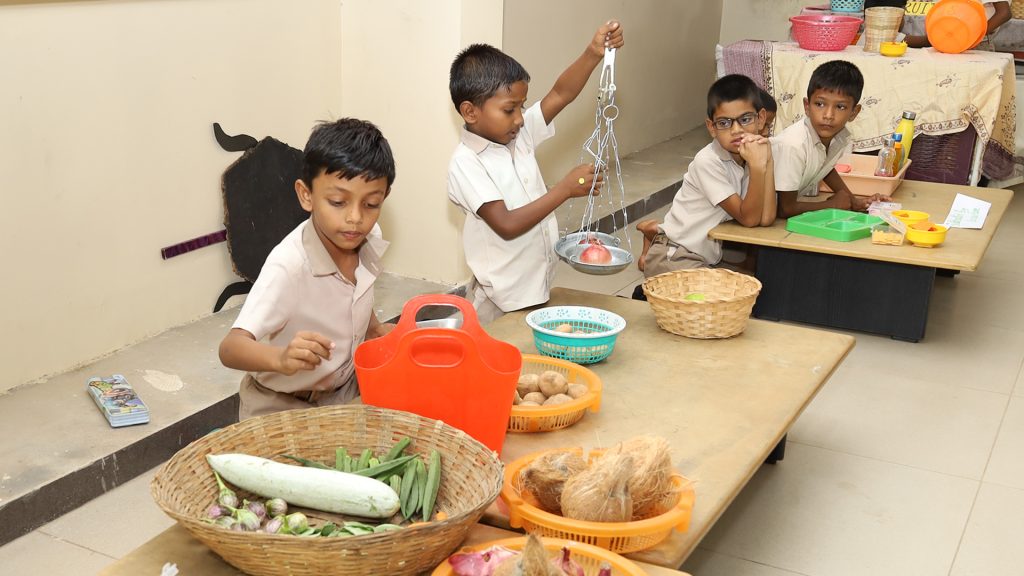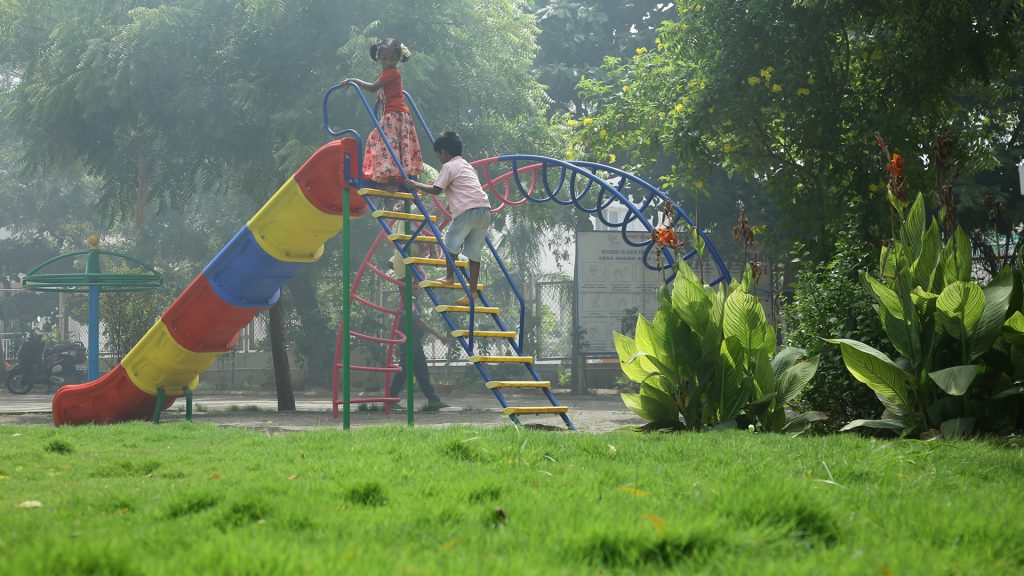

Curriculum
Overview
- 21st Century is uncertain.
- The career that was not known in the 20th Century now exists; so we do not know for what career we need to prepare our students.
- The gadgets that were not known in the 20th Century now exist; so we do not know what gadgets our students are going to use in future.
- In the above context, we understand that our curriculum has to be challenging to teach 21st Century students with 20th Century teachers.
- We strongly believe that ‘Pre-packaged curriculum’ undermines teachers’ professionalism. So, we have designed our own school curriculum based on NCF-2022 guidelines.
- Our curriculum is child-centred, purposeful, meaningful, relevant, collaborative and enjoyable. It discourages rote memory and encourages project-oriented learning. It will motivate students to question ‘why’, ‘what’ and ‘when’.
We understand that each student is different, so our curriculum will be
- Inclusive and assist every student regardless of ability.
- Helpful to reach and cater to student’s potential as learners.
- Forward-looking and preparing students for future.
- able to develop student’s competency in areas such as,
- Communication
- Collaboration
- Critical thinking
- Problem-solving
- Creativity
- Diversity
- Learning to learn
- Skills to learn independently

Our teachers will provide space to adapt the curriculum to suit the students of a class. N.M.S.V.S.K. will not demand that every student learn exactly the same content, the same way and exactly the same number of hours. It will provide flexibility for teachers to ensure that treatment of content is appropriate to students’ needs and capabilities.

The curriculum and pedagogy that NMS schools promote, will acknowledge that students learn in different and individual ways.
- Some students are very effective and skilled listeners; they are auditory learners.
- Some require pictures, slides and videos, they are visual learners.
- Other learn the best through practical exercises; they are kinesthetic learners.
Some students tread like a tortoise, they move slowly step by step. Others are like rabbits, they hop and skip steps. A good quality curriculum will encourage teachers to get to know their student’s learning styles and behavior and then direct them toward achieving the best learning outcomes. Our school curriculum provides everything that the students need. It is not textbook-driven.
Kindergarten children blossom in a nurturing environment. The curriculum is designed to enhance a child’s natural instincts to question, discover and participate. The school provides opportunities for all children to interact and expose their feelings in their mama lingo.
- Class Teacher ratio will be 15: 1 and a caretaker to give individual care and the need of little ones. In NMS schools, teachers don’t force children to learn, but they create an environment to learn. In the core portion of the kindergarten program, students will develop their literacy and math skills.
- Sensory development and an environmental approach to learning make our curriculum holistic and child-centric. In kindergarten we celebrate color days, chef day, no plastic day, fruit salad day, veggie day, green day to maximize his/her eventuality in a comfortable and non-competitive environment. More activities are listed in the yearly planner.
- A kindergarten kit isn’t merely about textbooks; it is a combination of pre-recorded lessons, activities, stories, posters, and games to offer your children a stimulating experience.
-
We follow ‘Happy Tots’ early learning programme. We use :
Happy phonics books
Happy times readers - A Primary focus of language through arts instruction will help students to make sense of each alphabet and its role in reading. Kindergarten students develop skills in speaking and listening throughdiscussion with peers.

Grade I to II
Classroom
Home work
- Listening
- Speaking
- Reading
- Writing
School Events
- Green peace day
- Rashtriya poshan Maah
- Gandhiji Loin cloth revolution
- Bharathiyar Remembrance Day
- Teacher’s day
- Ramanujan’s day celebration
Grade III to V
Speaking, writing and reading in English, Tamil and Hindi are given importance in Grades III to V. We believe a child who can speak fluently in their mother tongue , can speak fluently in English. Speaking in English is not knowledge, it is only a skill. Assessment for classes III to V is purely based on the grading system.
Grade VI to VIII
The middle school, provides a broad and balanced education for young learners, helping them to thrive throughout their schooling, work, and life. With ten subjects to settle on, including English, Mathematics, and Science, students will find many opportunities to
Our curriculum is predicated on communication, assessing the delicacy of the knowledge, decision-making, planning and goal-setting, self-control, and self- management that enable students to create personal confidence, deal with social pressures, and to avoid or reduce risk behaviors.
Grades IX & X
Our motto at the Secondary School level is to prepare the students according to the NCERT curriculum. The curriculum in Class IX and X is intended to offer complete full-fledged development of the students. Evaluation is based on both scholastic and co-scholastic areas. We also develop interpersonal and intrapersonal skills for the students to get management first rate. The medium of guidance is English.
An atmosphere of relaxed easy human relationships between the children and the teacher pervades the classroom. The children are encouraged to get involved in the exciting adventure of learning experiences through discussion, inquiry, and experimentation.
We provide an opportunity to transform the student through education and shape their minds for a satisfied and happy destiny.
- Tamil
- English
- Mathematics
- General Science
- Social Studies
- Sensory Play (learning through senses),
- Exploratory Play (learning by finding out),
- Kinaesthetic Play (learning by touch/feel/manipulating),
- Dramatic Play (learning by role-taking/pretending) ,
- Creative (learning by creating)
Grades XI & XII
At this stage, students will be blended with studies and career paths. Visiting faculties will provide input about their profession or business or industry. The acquired knowledge will further be enhanced through personal visits to the profession, business and industry visits. Projects will provide hands on experience and they will develop a culture to seek data through enquiry.
About cources in GRADE - XI
Group – I: English, Physics, Chemistry, Mathematics, Biology
Group – II: English, Physics, Chemistry, Mathematics, Computer Science
Group – II: English, Physics, Chemistry, Biology, Computer Science
Group – IV: English, Economics, Accountancy, Business Studies, Computer Science
School Hours
The school timings will be age-appropriate. This difference in timings may cause some difficulty to parents who have more than a child studying in different classes, yet they should understand the ideology behind it and cooperate with the school.

PRE KG, LKG & UKG – From 9.00 am to 2.30 pm
Class I & II – From 9.00 am to 4.00 pm
Class III to V – From 8.40 am to 4.00 pm
Class VI & VIII – From 8.40 am to 4.10 pm
Class IX to XII – From 8.40 am to 4.00 pm
Extra Curricular
The school has a full-fledged basketball court, hand ball court, kabaddi court and a kho-kho playing area. Students will be divided into four houses and intra-murals will be conducted in all sports and games activities. Annual sports day will be a grand affair where every child will have an opportunity to participate.
Independence day and Republic day will be celebrated to induce and nurture the patriotic fervour in our students. Farmers’ day and Education day will be celebrated to make students understand the importance of farming and education. The Annual day with cultural programmes by students will be a great treat for the eyes. The school will ensure that every child participates in one programme or the other.
Every student will be encouraged to develop the habit of collecting materials as a hobby. The hobbies for primary classes are, LKG – Chocolate wrappers, UKG – Greeting cards Class I – Feathers, Class II – Shells, Class III – Stones, Class IV – Stamps, and Class V – Coins. The choice is left to students from class VI onwards.
“In the mind of every artist, there is a masterpiece.” We encourage our children to engross themselves in art and evince their masterpieces to showcase their talent by conducting “Hobbies Day”.
Each house of a class will jointly involve in gardening in a specified area and be ready for assessment in February. The flowers and vegetables they produce will be real and provide a sense of achievement irrespective of whether they win or lose.
It is a unique mela conducted in the month of July that will bring out the inner talent of a student. There will be independent competitions, paired competitions and group competitions. This will be a week-long activity where every student will be eager to participate.
on At the beginning of every year, an Expo will be conducted on any one of the following subjects a rotation basis.
- Language
- Mathematics
- Social studies
- Science
Art will be integrated with all four subject expos.
All students will prepare charts, and models both static and dynamic showcasing the topics they learnt in the earlier class. This will not only strengthen what was learnt but will also make them expressive.
Co-curricular activities will be a part of the curriculum. Students will learn yoga and life skills where they will acquire the knowledge of gardening, cooking, handwork, fish breeding and beekeeping.
Scouts & Guides foster the personality development of the students and help them imbibe a sense of social responsibility. They become disciplined, courageous, mentally and physically strong so that they can make a positive contribution to their community and the wider world. A one-day camp will be organized for Cubs & Bulbuls and a five-day camp for Scouts & Guides.
Every class will be taken for a field trip for a day in an academic year. Such trips expose them to being together and getting to know our environment and surroundings.
Educational tours that extend for three to ten days are undertaken from Class VI onwards. It will be educational, so we expect every parent to send their child. Night stays and being away from parents teach students to be independent.





